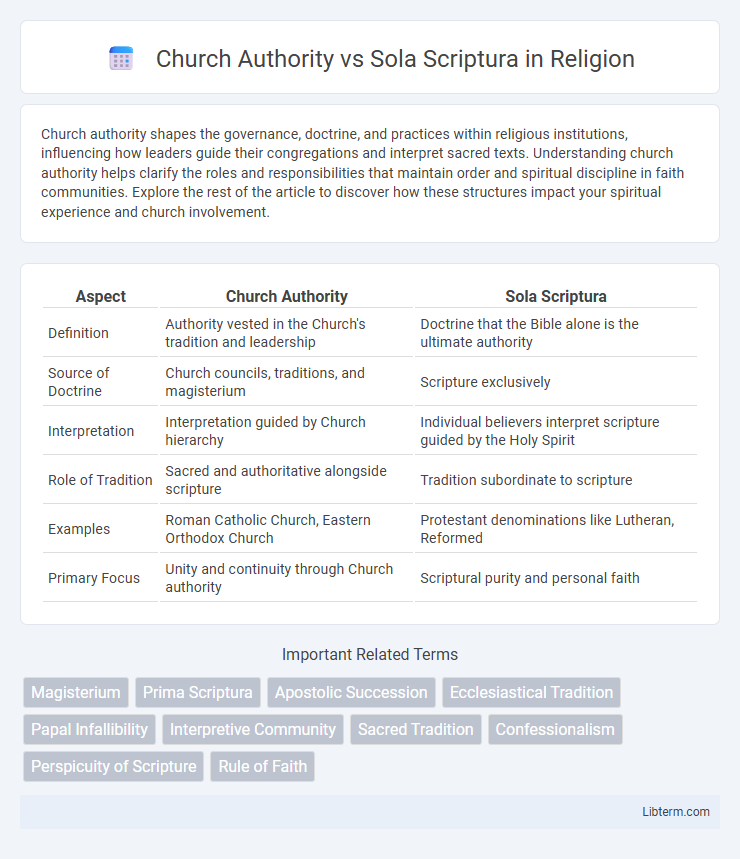Church authority shapes the governance, doctrine, and practices within religious institutions, influencing how leaders guide their congregations and interpret sacred texts. Understanding church authority helps clarify the roles and responsibilities that maintain order and spiritual discipline in faith communities. Explore the rest of the article to discover how these structures impact your spiritual experience and church involvement.
Table of Comparison
| Aspect | Church Authority | Sola Scriptura |
|---|---|---|
| Definition | Authority vested in the Church's tradition and leadership | Doctrine that the Bible alone is the ultimate authority |
| Source of Doctrine | Church councils, traditions, and magisterium | Scripture exclusively |
| Interpretation | Interpretation guided by Church hierarchy | Individual believers interpret scripture guided by the Holy Spirit |
| Role of Tradition | Sacred and authoritative alongside scripture | Tradition subordinate to scripture |
| Examples | Roman Catholic Church, Eastern Orthodox Church | Protestant denominations like Lutheran, Reformed |
| Primary Focus | Unity and continuity through Church authority | Scriptural purity and personal faith |
Defining Church Authority: Historical Context
Church authority historically derives from apostolic succession, establishing a hierarchical structure validated by Church councils and early Church Fathers. This framework affirms the Magisterium's role in interpreting Scripture and Tradition as a unified source of divine revelation. The doctrine evolved through pivotal events such as the Council of Nicaea (325 AD) and the Council of Trent (1545-1563), underscoring the Church's authoritative teaching office.
The Origins of Sola Scriptura
The concept of Sola Scriptura emerged during the Protestant Reformation in the 16th century as a response to perceived church abuses and doctrinal errors, emphasizing that Scripture alone is the supreme authority in matters of faith and practice. Reformers like Martin Luther challenged the Catholic Church's reliance on church authority and tradition, asserting that biblical texts should be accessible and interpreted directly by believers without institutional mediation. This principle contrasted sharply with the established Catholic view, which upheld the dual authority of Scripture and sacred tradition under the magisterium, or teaching authority, of the church hierarchy.
Scriptural Basis for Church Authority
Church authority is grounded in biblical passages such as Matthew 16:18-19, where Jesus grants Peter the "keys of the kingdom," symbolizing authoritative leadership and binding power within the church. The New Testament also highlights the role of apostles, elders, and bishops in teaching and maintaining doctrinal integrity (Acts 15:28-29; 1 Timothy 3:1-13). These Scriptures provide a foundation for ecclesiastical authority as a divinely instituted structure complementing the ultimate authority of Scripture itself.
Key Arguments for Sola Scriptura
Sola Scriptura asserts that Scripture alone is the ultimate authority for Christian faith and practice, emphasizing the Bible as the inspired, inerrant Word of God that stands above church traditions and ecclesiastical decrees. Proponents argue that relying solely on Scripture prevents doctrinal errors introduced by human interpretation or institutional corruption, maintaining purity and clarity of the gospel message. This principle is grounded in biblical passages such as 2 Timothy 3:16-17, which highlight Scripture's sufficiency for teaching, rebuking, correcting, and training in righteousness.
Catholic and Protestant Perspectives Compared
Catholic theology emphasizes Church authority as essential, viewing the Magisterium--the pope and bishops--as the authentic interpreters of Scripture and Tradition, ensuring doctrinal unity. Protestant perspectives uphold Sola Scriptura, asserting that Scripture alone is the supreme authority for faith and practice, rejecting ecclesiastical interpretations that contradict biblical texts. This foundational divergence shapes doctrinal interpretation, ecclesiastical hierarchy, and the role of tradition within Christianity.
Doctrinal Unity vs. Interpretive Freedom
Church Authority ensures doctrinal unity by providing a centralized interpretation of Scripture, preventing divergent teachings and maintaining consistent belief systems within the faith community. Sola Scriptura promotes interpretive freedom by allowing individuals to study Scripture independently, which can lead to diverse understandings and theological variations. The tension between these perspectives centers on balancing the preservation of unified doctrine with the right to personal scriptural interpretation.
The Role of Tradition in Christian Faith
Church authority upholds sacred Tradition as a vital source of divine revelation alongside Scripture, emphasizing the continuous teaching authority of the Magisterium to interpret biblical texts. Sola Scriptura asserts the Bible as the sole infallible authority for Christian faith and practice, rejecting the equal binding status of Tradition. The role of Tradition in Christian faith remains a pivotal point of contention, influencing doctrinal development and the understanding of divine truth within various Christian denominations.
Contemporary Challenges to Authority and Scripture
Contemporary challenges to Church authority and Sola Scriptura revolve around the growing influence of individual interpretation and digital media, which often undermine traditional ecclesiastical structures and scriptural consensus. The proliferation of online theological resources creates diverse and sometimes contradictory interpretations, complicating the Church's ability to maintain doctrinal unity. This dynamic intensifies debates over the balance between institutional authority and personal scriptural engagement in modern Christian communities.
Ecumenical Dialogue on Authority and Scripture
Ecumenical dialogue on Church authority and Sola Scriptura centers on reconciling the Roman Catholic and Protestant views regarding the role of tradition and Scripture in doctrinal authority. While Catholics uphold the Magisterium alongside Sacred Tradition as necessary for interpreting Scripture, many Protestants emphasize Sola Scriptura, asserting Scripture alone as the supreme authority. Ongoing discussions aim to bridge these perspectives by exploring common ground in the understanding of biblical interpretation, tradition's role, and the nature of ecclesial authority.
Faith, Authority, and the Modern Church
Church Authority upholds tradition and ecclesiastical hierarchy as foundational to interpreting Scripture and guiding faith, emphasizing the role of the Magisterium in doctrinal decisions. Sola Scriptura asserts Scripture alone as the ultimate authority for faith and practice, rejecting extra-biblical traditions and emphasizing individual interpretation under the Holy Spirit's guidance. The modern church grapples with balancing these perspectives, addressing challenges of doctrinal unity and personal faith experience amid diverse theological interpretations.
Church Authority Infographic

 libterm.com
libterm.com